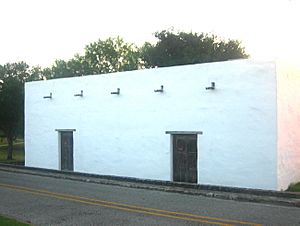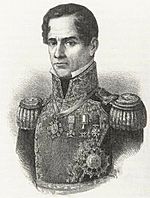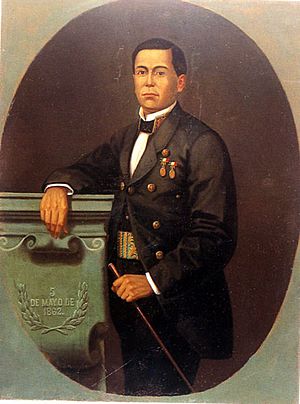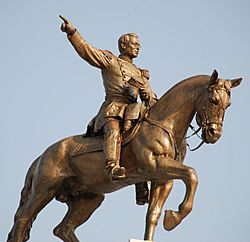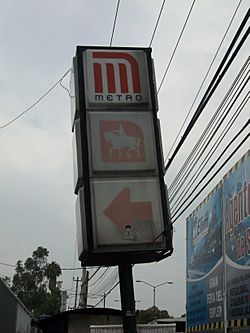Ignacio Zaragoza facts for kids
Quick facts for kids
Ignacio Zaragoza Seguín
|
|
|---|---|
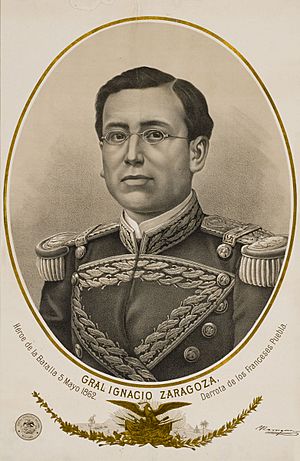
Ignacio Zaragoza
|
|
| Secretary of War and Navy | |
| In office April 13, 1861 – December 22, 1861 |
|
| President | Benito Juárez |
| Preceded by | Jesús González Ortega |
| Succeeded by | Pedro Hinojosa |
| Personal details | |
| Born | March 24, 1829 Presidio La Bahía, Coahuila y Tejas, Mexican Republic (now Goliad, Texas, U.S.) |
| Died | September 8, 1862 (aged 33) Puebla, Mexico |
| Resting place | Panteón de San Fernando Mexico City [1] |
| Military service | |
| Allegiance | |
| Branch/service | Mexican Army |
| Years of service | 1853–1862 |
| Rank | General Secretary of War |
| Battles/wars |
|
Ignacio Zaragoza Seguín (born March 24, 1829 – died September 8, 1862) was a brave Mexican general and a smart politician. He is famous for leading a smaller Mexican army to victory. They defeated a much larger French army at the Battle of Puebla on May 5, 1862. This day is now celebrated as Cinco de Mayo, especially in the United States.
Ignacio Zaragoza also married Maria Rosa de la Riva Palacio. Her father was a lawyer and politician named Mariano Riva Palacio. Her grandfather was Vicente Guerrero, who was the second President of Mexico.
Contents
Early Life and Family
Ignacio Zaragoza was born in a village called Bahía del Espíritu Santo. This was in the Mexican province of Texas on March 24, 1829. Today, this place is known as Goliad, Texas, in the United States.
His father, Miguel Zaragoza, was a soldier. His mother was María de Jesús Seguín. She was related to important people like Erasmo Seguín and Juan Seguín. In 1834, Zaragoza's family moved to Matamoros, Mexico. Later, in 1844, they moved to Monterrey, Mexico. Young Ignacio went to a seminary there.
By 1846, Ignacio wanted to join the military. He wanted to become a cadet for the Mexican army. This was during the Mexican–American War. In 1851, he married Maria Rosa de la Riva Palacio. They had one son, Ignacio Esteban de Zaragoza y Riva Palacio.
Military Career and Rise to General
When the United States was fighting Mexico, Zaragoza wanted to join the army. He volunteered to be a cadet, but the Mexican army did not accept him at first. So, from 1846 to 1850, Zaragoza worked in business.
In 1852, he got his first chance to serve the government. He was offered a position in the national guard. The next year, in 1853, Zaragoza joined a part of the Mexican army. He quickly became a sergeant. Zaragoza joined the army to support the Liberal Party. They were against the dictator Antonio López de Santa Anna.
Zaragoza's first big military experience was in 1854. He led the liberal army against General Santa Anna. This fight was called the Revolution of Ayutla. It lasted until 1856. Zaragoza and the Mexican liberals won this revolution. This was a very important victory for Zaragoza.
This win led to big political changes in Mexico. It helped bring back a democratic government. But this also caused more political problems from 1856 to 1857. By 1857, Zaragoza was fighting in a Mexican civil war. He fought against conservative leaders like Leandro Márquez and Miguel Miramón. Zaragoza was so dedicated that he even missed his own wedding to lead his army.
He won the war on December 22, 1860. He defeated the conservative forces in the Battle of Calpulalpan. After this victory, the Mexican president, Benito Juárez, offered Zaragoza a political job.
Serving as a Politician
In 1861, President Benito Juárez appointed Zaragoza as the Minister of War and Navy. This was a very important job. He was in charge of deciding where and how the Mexican military and navy would be used. Zaragoza was very good at this job because of his military success.
During his time in office, Zaragoza helped President Juárez. They worked to delay Mexico's debt payments to France for two years. In 1862, Zaragoza's wife sadly passed away. Also, Mexico needed generals to fight France in the east. So, Zaragoza decided to leave his political role. He wanted to lead the Army of the East (Ejército de Oriente). He would fight against the Europeans, especially the French. The French were using Mexico's debt as an excuse to invade. After this, Zaragoza never held a political office again.
When the forces of Napoleon III invaded Mexico, Zaragoza was in charge of the Mexican forces. He fought the French at Acultzingo on April 28, 1862. He had to pull back because the French had more soldiers.
The Famous Battle of Puebla
The Battle of Puebla is the most important part of Zaragoza's story. This battle happened on May 5, 1862. In Puebla, Mexico, Napoleon III of France sent his army to take over part of Mexico. He wanted to make it a French territory. President Benito Juárez sent Zaragoza and his army to stop them.
Zaragoza moved his army to strong defensive forts outside the city of Puebla. His army was not as well-equipped as the French. But they bravely fought back many French attacks on Fort Loreto and Fort Guadalupe. Zaragoza stayed strong and ordered several counterattacks. He kept the French from reaching the capital city.
Then, he took the lead and ordered a big counterattack. This made the French army retreat to Orizaba. Zaragoza's men chased after them. After a full day of fighting, Zaragoza and his forces won the battle. They lost about 90 men, while the French lost around 1,000 soldiers. After this amazing victory, Zaragoza became a Mexican war hero. This win led to the creation of the famous holiday, Cinco de Mayo.
Death and Lasting Legacy
Not long after his great victory, Zaragoza became sick with typhoid fever. He died at the young age of 33. His army later faced defeats because they did not have a commander as good as him.
He was first buried in San Fernando Cemetery in Mexico City. Later, his body was moved to Puebla. His first tomb became a monument to him. When the French finally left Mexico, Zaragoza became a legend. He was one of the few Mexican generals to win a battle against what was then considered the greatest army in the world.
Zaragoza's famous quote is: Las armas nacionales se han cubierto de gloria. This means "The national arms have been covered with glory." He wrote this in a short letter to President Juárez to tell him about the victory. This quote, along with Zaragoza's picture, was on Mexican 500-peso banknotes from 1995 to 2010.
Many places in Mexico are named after Zaragoza. There is a municipality in the state of Chihuahua. There are also towns named after him in Chiapas, Puebla, and Tlaxcala. Many rural areas across Mexico are also named Zaragoza.
Calzada Ignacio Zaragoza is a major road in Mexico City. There is also a subway station on Line 1 of the Mexico City Metro named after him. In the 2013 movie Cinco de Mayo La Batalla, actor Kuno Becker played Zaragoza.
See also
 In Spanish: Ignacio Zaragoza para niños
In Spanish: Ignacio Zaragoza para niños
- Benito Juárez
- French intervention in Mexico 18th century
Sources
- "Zaragoza Seguín, Ignacio ". The Handbook of Texas Online. Retrieved July 1, 2005.
- Anonymous, “Zaragoza, Ignacio Seguín,” Handbook of Texas Online, accessed November 2, 2021, Published by the Texas State Historical Association.
- Texas General Land Office, “The Texas Hero of Cinco De Mayo: Ignacio Zaragoza, and the Origins of the Celebration.” Medium, Medium, April 29, 2020
- Strong, W.F. “The Hero of Cinco De Mayo.” Texas Co-op Power Magazine, May 2021, https://www.texascooppower.com/texas-stories/history/the-hero-of-cinco-de-mayo.
- Herz, May, et al. “Inside MéXico.” Inside Mexico, Inside Mexico, January 1, 1962
 | Georgia Louise Harris Brown |
 | Julian Abele |
 | Norma Merrick Sklarek |
 | William Sidney Pittman |


